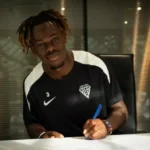Since their historic World Cup performance in 2022, Walid Regragui’s Morocco has undergone significant tactical transformation.
The coach is now focused on pushing his team beyond their established defensive solidity, aiming to evolve into a more dynamic and ambitious unit that can dominate the international stage.
In an exclusive interview with AS, Regragui shared his vision for the future and how he plans to take Morocco from their previous defensive success to a more comprehensive and attacking style of play.
Following Morocco’s breakthrough performance in Qatar, where they made it to the semifinals, the team faced a new challenge: the 2023 Africa Cup of Nations.
However, their campaign in the tournament ended prematurely, as they were eliminated in the round of 16 by South Africa with a 2-0 defeat.
This setback raised questions about the viability of Morocco’s initial tactical approach and forced Regragui to reassess his team’s long-term strategy.
The coach sees this early exit as a critical turning point in his plans for the national team.
“Yes, the World Cup marked a before and after,” Regragui explained. “We had a model for the World Cup, where we played against the best teams, and it was normal not to have much of the ball.”
During the World Cup, Morocco excelled with a defensively disciplined setup, focusing on counter-attacking football that allowed them to frustrate their opponents.
But Regragui acknowledges that while this defensive strength was effective in Qatar, it was not enough to propel the team to sustained success in the future.
“After a World Cup, teams tend to change their game plan,” he said. “If you come from a model of being strong and well-positioned defensively, you need time to implement an evolution.”
For Regragui, the next step was clear: it was time to transition Morocco into a more attacking, possession-based team, capable of breaking down organized defenses.
The shift towards a more proactive style of play is not a trivial one. Regragui recognizes that dominating possession and consistently breaking down tight defensive lines requires new tactical principles and, crucially, more creative and versatile players. He offered a candid assessment of the challenges involved in making this transition.
“Positional play requires time and quality players,” Regragui said. “We need players capable of unbalancing a low block, and we lacked that.”
He added, “It’s always easier to defend in a low block than to attack a low block. It takes time, and we know that.”
Aware of these challenges, Regragui has been diligently working to identify and nurture talent that can provide the creativity and depth required for this tactical evolution.
His efforts include extensive scouting trips across Europe to engage with dual nationals such as Ilias Akhomach, Ben Seghir, Talbi, and Sahraoui, among others.
These efforts are part of a broader strategy to expand Morocco’s player pool and bring in fresh talent capable of making an impact.
The lessons from the World Cup are clear, according to Regragui: while a disciplined and organized team can achieve remarkable results, sustained success at the highest level requires more than just tactical rigour.
“At the World Cup, we realized that we needed more talent to win,” he said. “It’s a lesson for a team that wants to be great. We can do things with an average team, but to win, we need more.”
Despite the obstacles and the relatively short period of time since the World Cup, Regragui is optimistic about Morocco’s progress. “In eight months, we haven’t been able to fully change our mindset, it’s a short period of time,” he acknowledged.
Nonetheless, the results so far have been promising. The team has secured 11 wins and one draw, with a positive goal difference. These achievements point to the early stages of a promising evolution for Moroccan football, even though the road ahead remains challenging.
As Regragui continues to reshape Morocco’s tactical approach, the goal is clear: to move beyond the defensive solidity that carried them to the World Cup semifinals and develop into a more well-rounded team capable of competing for titles.
The coming months will be crucial in determining whether the transformation can be fully realized and if Morocco can solidify its position as one of Africa’s top footballing nations.










